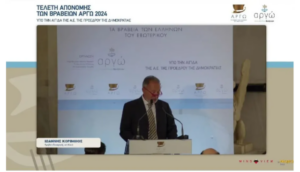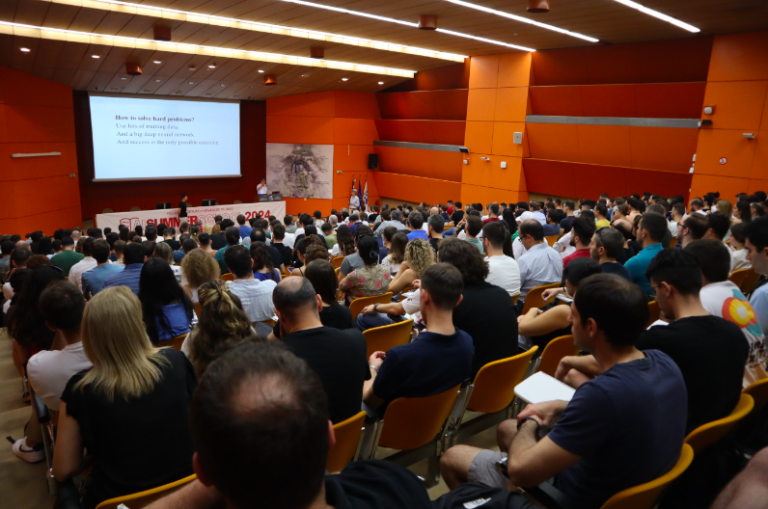Professor of Modern Greek Language Ioannis Korinthios was recently honored for his tireless efforts to establish the World Greek Language Day, as well as for his long-standing contributions to the Greek diaspora in Italy.
The Award
The recognition for Professor Korinthios came from ‘ARGO’, a network of Greeks in the diaspora based in Brussels, which awards prizes to 8 Greeks who have distinguished themselves in their respective fields. The Professor was honored for his contributions to the Greek diaspora and the initiatives he has taken to strengthen the identity of Greek communities in Italy, as well as his efforts to establish the World Greek Language Day. The award ceremony took place at the Academy of Athens and was presented by the President of the Hellenic Republic, Katerina Sakellaropoulou. “This recognition is not only for me but for all Greeks in the diaspora who work daily to preserve our identity,” said the Professor.
A year earlier, the President of the Hellenic Republic awarded Korinthios the Grand Cross of the Order of Honour for his contribution to the dissemination of the Greek language and culture.
From Teaching to International Advocacy
With many years of service at the Universities of Naples and Calabria, Professor Korinthios’s work includes, among other things, the creation of textbooks on Ancient Greek for the Classical High Schools of Italy and the development of a digital Ancient Greek dictionary with 140,000 entries, a project that took 35 years to complete.
The idea for establishing the World Greek Language Day emerged in 2014, when, as President of the Federation of Greek Communities in Italy, he learned about the existence of the Day of Francophonie. “If there is a day for Francophonie, why not for Hellenophonie?” he asked. With a letter to the President of the Hellenic Republic, the Government, and the relevant ministers, he submitted the request.
Professor Korinthios was invited to present his idea to the Greek Parliament, where it was warmly received. The initiative came to fruition in 2017, when Greece officially declared February 9th as World Greek Language Day through a joint ministerial decision. Since then, the celebration has taken place worldwide, wherever there are Greek communities and Philhellenes. Currently, efforts are underway to gain recognition from UNESCO.
In Italy, the Professor’s vision for celebrating the Greek Language began to take shape in 2016, when over 1,000 students from 30 high schools in Naples gathered every year, with participation from students from Greece as well.
Historical Research and Preserving Greek Roots
In parallel with his teaching and initiatives for the Greek language, Professor Korinthios engaged in research and documentation of the history of the Greek diaspora in Southern Italy. One product of his research was the publication of the book The Greeks of Naples and Southern Italy from the 15th to the 20th Century, which has become a reference for the history of Greek presence in the region after the fall of Constantinople.
As part of his research in the archives of Naples and the Vatican, Korinthios discovered invaluable unpublished documents that document the contribution of the Greek diaspora and Philhellenes in Italy during the Greek War of Independence of 1821. His efforts in this field led to the organization of an international exhibition in 2021, marking the 200th anniversary of the Greek Revolution, in collaboration with the General State Archives of Greece and the Society for Cypriot Studies, titled Naples and the Greek Revolution – Napoli e Risorgimento Greco.
The ‘Guardian’ of Hellenism in Naples
Beyond his academic activities, Ioannis Korinthios worked to restore the historic ‘Street of the Greeks’ (Via dei Greci) in the Greek Quarter of Naples, which had been abolished by Mussolini. “The ‘Street of the Greeks’ existed for 500 years in the Greek Quarter of Naples,” the Professor begins, adding, “Via dei Greci runs alongside the Greek Church of Saints Peter and Paul, the oldest church of the historical diaspora, which has been in operation since 1764.”
“My Homeland is the Language”
“The issue of preserving the Greek language is very serious, because it means preserving our identity,” emphasizes Professor Ioannis Korinthios, adding, “Language is our identity, our homeland – as Kazantzakis said. In Southern Italy, where there are Greek-speaking enclaves, Italians feel 100% Greek – even if they don’t speak the language. They feel they have Greek cultural roots,” he notes.
This Year’s Celebration of World Greek Language Day
“We are now preparing for the celebration of February 9th,” says Professor Korinthios. “In Naples, the celebration will be held at the San Giovanni Maggiore Basilica, which houses a chapel of the Palaiologos from 1523. Around 30 high schools will participate, and 5 high schools from Greece will also attend. This year’s theme is the word ‘Friendship’. We based it on Sophocles’ saying, ‘We were not born to be enemies, but to love each other.'”
Ask me anything
Explore related questions





